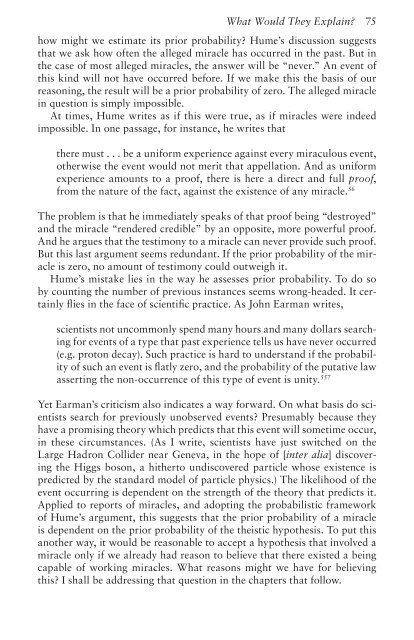Theism and Explanation - Appeared-to-Blogly
Theism and Explanation - Appeared-to-Blogly
Theism and Explanation - Appeared-to-Blogly
Create successful ePaper yourself
Turn your PDF publications into a flip-book with our unique Google optimized e-Paper software.
What Would They Explain? 75<br />
how might we estimate its prior probability? Hume’s discussion suggests<br />
that we ask how often the alleged miracle has occurred in the past. But in<br />
the case of most alleged miracles, the answer will be “never.” An event of<br />
this kind will not have occurred before. If we make this the basis of our<br />
reasoning, the result will be a prior probability of zero. The alleged miracle<br />
in question is simply impossible.<br />
At times, Hume writes as if this were true, as if miracles were indeed<br />
impossible. In one passage, for instance, he writes that<br />
there must . . . be a uniform experience against every miraculous event,<br />
otherwise the event would not merit that appellation. And as uniform<br />
experience amounts <strong>to</strong> a proof, there is here a direct <strong>and</strong> full proof,<br />
from the nature of the fact, against the existence of any miracle. 56<br />
The problem is that he immediately speaks of that proof being “destroyed”<br />
<strong>and</strong> the miracle “rendered credible” by an opposite, more powerful proof.<br />
And he argues that the testimony <strong>to</strong> a miracle can never provide such proof.<br />
But this last argument seems redundant. If the prior probability of the miracle<br />
is zero, no amount of testimony could outweigh it.<br />
Hume’s mistake lies in the way he assesses prior probability. To do so<br />
by counting the number of previous instances seems wrong-headed. It certainly<br />
fl ies in the face of scientifi c practice. As John Earman writes,<br />
scientists not uncommonly spend many hours <strong>and</strong> many dollars searching<br />
for events of a type that past experience tells us have never occurred<br />
(e.g. pro<strong>to</strong>n decay). Such practice is hard <strong>to</strong> underst<strong>and</strong> if the probability<br />
of such an event is fl atly zero, <strong>and</strong> the probability of the putative law<br />
asserting the non-occurrence of this type of event is unity. 557<br />
Yet Earman’s criticism also indicates a way forward. On what basis do scientists<br />
search for previously unobserved events? Presumably because they<br />
have a promising theory which predicts that this event will sometime occur,<br />
in these circumstances. (As I write, scientists have just switched on the<br />
Large Hadron Collider near Geneva, in the hope of [inter alia] discovering<br />
the Higgs boson, a hither<strong>to</strong> undiscovered particle whose existence is<br />
predicted by the st<strong>and</strong>ard model of particle physics.) The likelihood of the<br />
event occurring is dependent on the strength of the theory that predicts it.<br />
Applied <strong>to</strong> reports of miracles, <strong>and</strong> adopting the probabilistic framework<br />
of Hume’s argument, this suggests that the prior probability of a miracle<br />
is dependent on the prior probability of the theistic hypothesis. To put this<br />
another way, it would be reasonable <strong>to</strong> accept a hypothesis that involved a<br />
miracle only if we already had reason <strong>to</strong> believe that there existed a being<br />
capable of working miracles. What reasons might we have for believing<br />
this? I shall be addressing that question in the chapters that follow.



